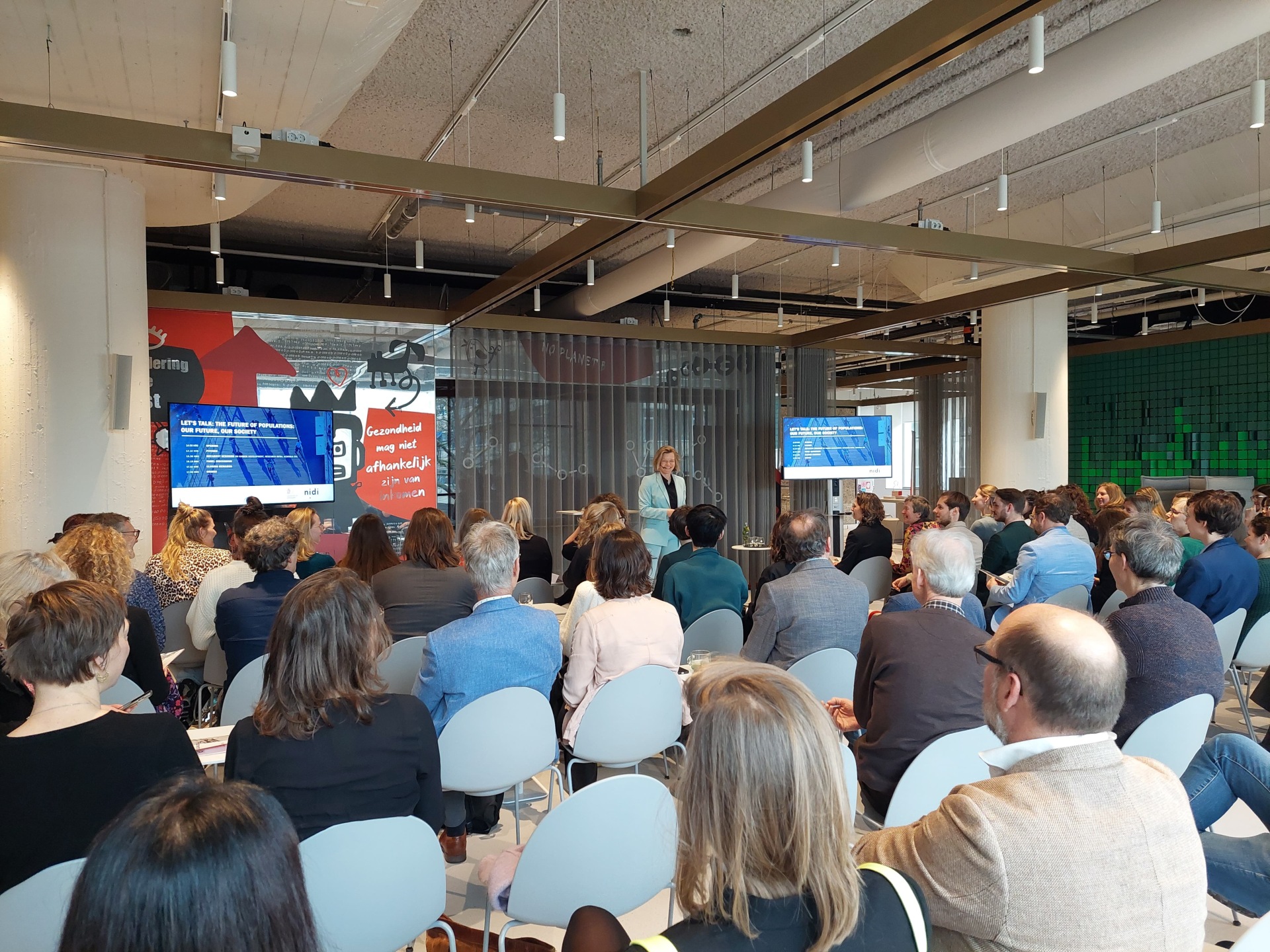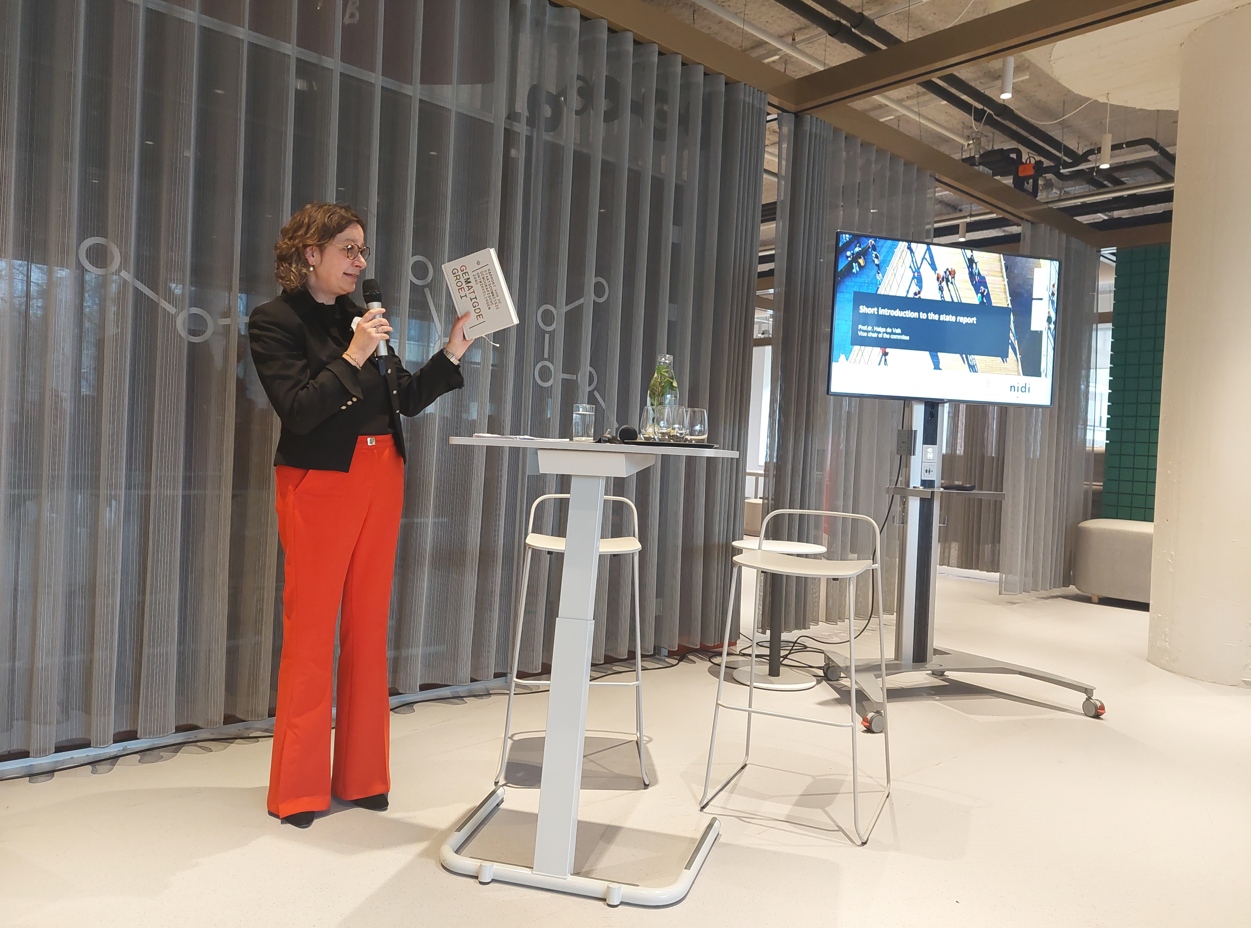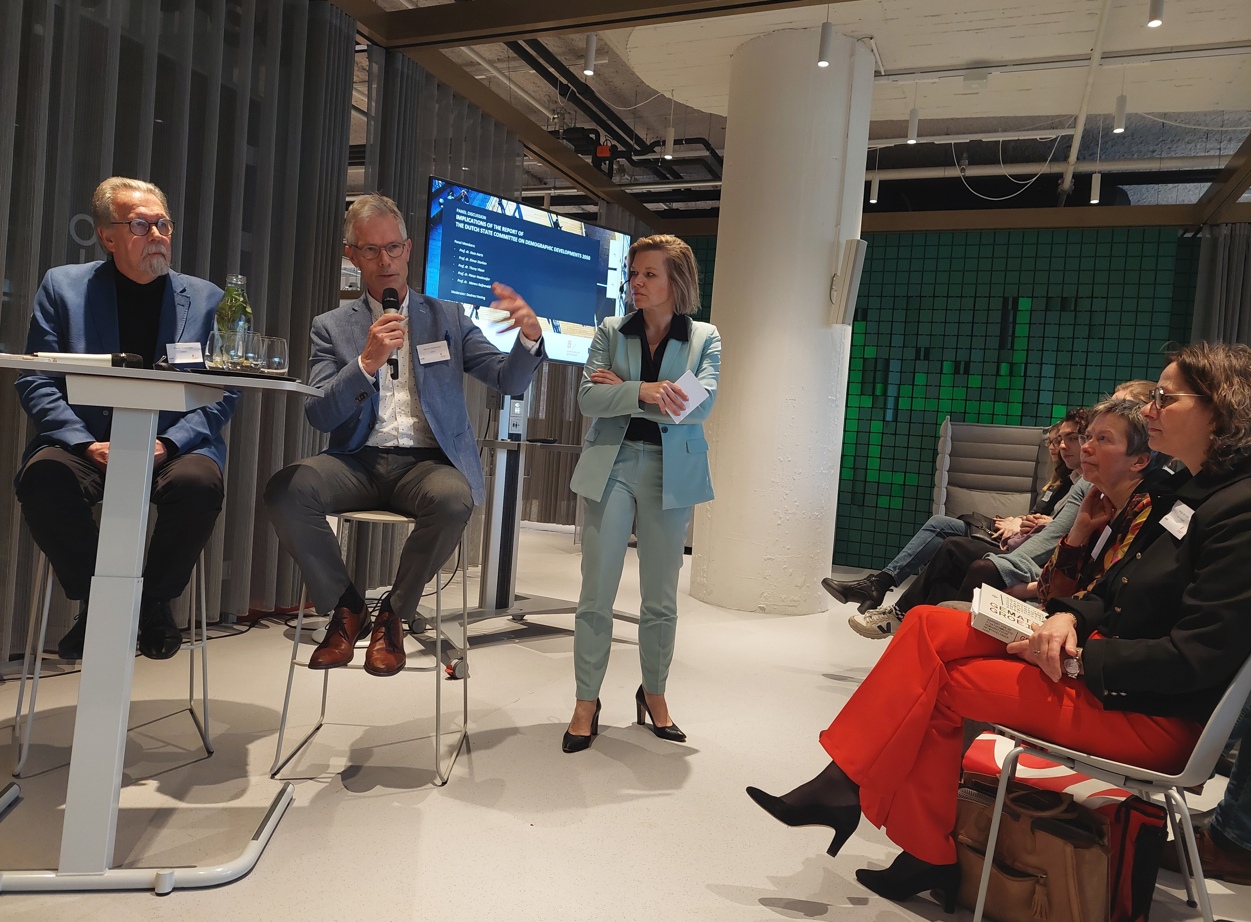Demography is about everyone - Looking back on the ‘Let’s talk population studies’ conference

Migration, the housing market, shrinking regions, and ageing: demography is a hot topic. This was also evident at the well-attended conference in the House of Connections: ‘Let’s talk population studies: Our future, our society’. The conference, which took place on 29 February, was organized to celebrate the renewed collaboration between the NIDI, the KNAW, the UMCG, and the University of Groningen.
Text: Jelle Posthuma
In her introduction, Helga De Valk, Director of the Netherlands Interdisciplinary Demographic Institute (NIDI), provided a brief account of the widely discussed report entitled ‘Gematigde groei’ [Moderate growth]. About seven weeks ago, the State Commission on Demographic Developments 2050 presented its findings. In 2050, the Netherlands will be busier, older, and more diverse than it is today. To keep the Netherlands liveable, it will be necessary to moderate migration and improve the distribution of the limited space. A middle-case scenario is needed: no shrinkage, no strong population growth, but ‘moderate’ growth.
In her introduction, De Valk referred to the increased ageing of the population. The Professor argued that, without international migration, the Dutch population would already be shrinking. Although migration could ease pressure on the labour market, it is not a cure for ageing, because migrants age as well. Above all, managing migration and preserving social cohesion calls for vision, as De Valk told the audience. She also pointed out the major differences between regions. The Randstad area is crowded, but border regions are already facing shrinkage.

Migration
During the conference, Desiree Hoving, the chair for the day, led five professors in a panel discussion, in which they considered migration and population ageing, as well as their consequences for the labour market. Kees Aarts, Professor of Political Institutions and Behaviour and Dean of the Faculty of Behavioural and Social Sciences, pointed to a ‘major gap’ between the report and the programmes of political parties, especially with regard to migration. Right-wing parties in particular attach great importance to limiting migration, with a primary focus on asylum seekers. Above all, however, the report stresses the need to make choices about labour migration. ‘They are two different worlds’, noted Aarts.
In his account, Pieter Hooijmeijer, Professor Emeritus of Social Geography and Urban and Regional Planning, and the adjunct director of research policy at the Royal Netherlands Academy of Arts and Sciences (KNAW), referred to the category of labour migrants. According to him, undesirable business models have been set up in several sectors: companies can survive only by underpaying migrant workers. For this reason, the Professor advocated a different form of human capital, in which investment in education is crucial. As Hooijmeijer quoted, ‘Drink deep, or taste not the Pierian spring’.
‘Battle for talent’
Elmer Sterken, Professor of Monetary Economics and former Rector Magnificus of the University of Groningen, pointed out the unpredictability of the labour market. It is uncertain what jobs will emerge—and disappear—in the near future. Sterken was aware that universities will therefore have to rethink the way they educate students, which will come to emphasise competences.
Thony Visser, Dean of the Faculty of Arts, agreed with Sterken. In her opinion, universities should redesign their degree programmes to address the ‘wicked problems’ of the present time. She also highlighted the importance of international staff and students at universities, who promote teaching and research. Until recently, the Netherlands was doing extremely well in this ‘battle for talent’, but it will have to keep investing, the experts stressed.
Societal debate
Professor of Social Medicine and Head of the UMCG Health Sciences department, Menno Reijneveld, spoke about the consequences for healthcare. According to the Professor, the healthcare system is under pressure due to the combination of high demand and an increasingly tight labour market, which is even more pronounced in the country’s northern region. He highlighted the importance of prevention to ensure that the healthcare is ready for the future. According to Reijneveld, the northern region of the Netherlands offers opportunities for becoming a forerunner in this field.
The day was concluded by Rector Magnificus Jacquelien Scherpen. In her opinion, the meeting at the House of Connections did not come a day too soon. ‘In the coming years, it will be up to you to contribute sound scientific insights to the public debate’. In this statement, she highlighted the importance of bringing together researchers from different institutions, from different institutes, and from different faculties. ‘I am convinced that we have more than succeeded in that intention today’.
Duo pitches
During the conference, NIDI Director De Valk referred to the importance of collaboration between knowledge institutions. Eight young researchers from the NIDI, the KNAW, the University of Groningen, and the UMCG had the opportunity to present their research in the field of demography in groups of two during the conference. Lonneke van den Berg talked about her research, for which she received a Veni grant in 2023. Van den Berg used figures to point out that young people are not as happy as previous generations were, and that they are more likely to continue living at home. According to the researcher, this can be explained by various environmental factors, including origin, education, and housing.
The account of the PhD student Alexandra Pior closely corresponded to this theme. During her pitch, Pior talked about the GUTS programme—Growing Up Together in Society—a broad partnership of various knowledge institutions that examines how young adults are growing up in today’s complex society. In her research, Pior focuses on the influence of age peers.
Juul Spaan took it from there and talked about her PhD research on pension migrants. Studies indicate that the group of Dutch retirees is generally very happy abroad, although some also face loneliness and broken family relationships. Following that, the PhD student Malin Katja Meyer talked about her research on identifying stress factors in the everyday life of modern society.
Joeke Kuyvenhoven presented her PhD research on the impact of relocation on the lives of children. According to her, children experience this very differently: moving to a better neighbourhood can have positive effects, but changing homes frequently can also seriously disrupt children’s development. Assistant professor Roselinde van der Wiel also addressed the topic of relocation. In her research, she examines relationships, family complexity, and long-distance moves, with the central question: who moves in with whom?
The final duo pitches were given by PhD researchers Anna Tort Carrera and Claudio Annibali. Carrera talked about her research on the neighbourhoods in which children grow up and how this affects their mental health. The PhD student compared it to the game Jenga: the more blocks are pulled away, the more unstable the structure becomes. Finally, Annibali talked about undiagnosed diabetics and its impact on the economy. Amongst other things, major sex differences apparently occur in diagnosis, Annibali concluded.

| Last modified: | 13 March 2024 11.35 a.m. |
More news
-
16 December 2024
Jouke de Vries: ‘The University will have to be flexible’
2024 was a festive year for the University of Groningen. Jouke de Vries, the chair of the Executive Board, looks back.
-
10 June 2024
Swarming around a skyscraper
Every two weeks, UG Makers puts the spotlight on a researcher who has created something tangible, ranging from homemade measuring equipment for academic research to small or larger products that can change our daily lives. That is how UG...
